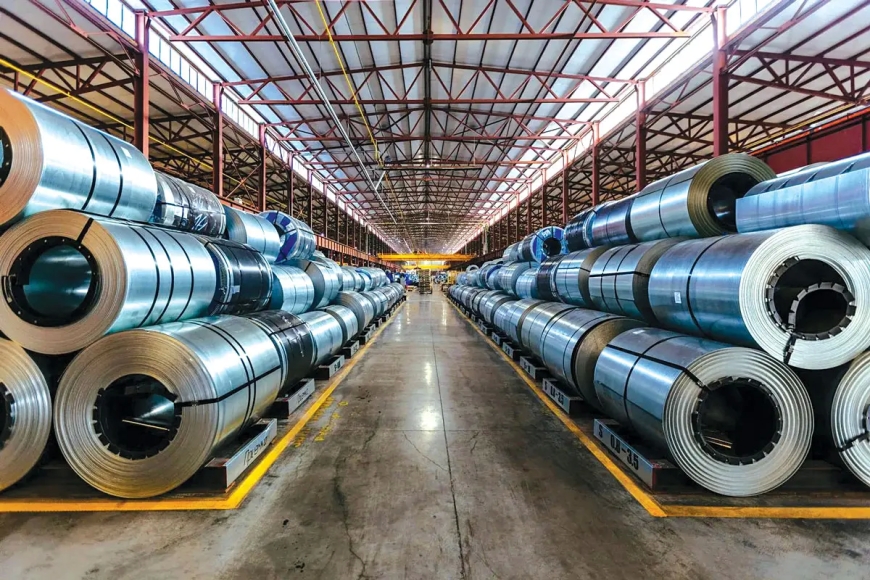Imposition of 12% SAFEGUARD DUTY on Steel Imports Raises Alarm in Indian CE Industry
The Indian Construction Equipment (CE) industry has raised strong concerns following the government’s announcement of a 12% safeguard duty on imports of non-alloy and alloy steel flat products.

The Indian Construction Equipment (CE) industry has raised strong concerns following the government’s announcement of a 12% safeguard duty on imports of non-alloy and alloy steel flat products. The decision, which aims to protect domestic steel producers, is expected to significantly disrupt the supply chain and cost structures within the construction equipment manufacturing sector—a vital contributor to India’s infrastructure growth.
Valued at approximately USD 9.5 billion, the Indian CE industry is the third-largest in the world, after the United States and China. It plays a pivotal role in nation-building by delivering high-performance machinery essential for infrastructure projects including roads, railways, bridges, and urban development.
Steel: A Critical, Irreplaceable Input
Steel is the most critical raw material in CE manufacturing, particularly specialized high-tensile and performance-grade steels that are currently not produced in India at sufficient volumes or specifications. As these materials are largely imported, the imposition of the safeguard duty immediately compromises manufacturers’ ability to source essential inputs, threatening both production continuity and the timely delivery of equipment.
Industry Already Facing Rising Costs and Supply Chain Strain
Even prior to the announcement, the mere initiation of the safeguard inquiry had triggered substantial price volatility, Indian Construction Equipment Manufacturers’ Association (ICEMA) said in a statement issued. Steel prices rose by approximately INR 10,000 per tonne during the course of the investigation, squeezing already narrow margins. With the 12% duty now officially imposed, input costs are expected to rise even further, forcing CE manufacturers to consider price hikes that will ultimately impact infrastructure project costs nationwide.
This development coincides with the recent implementation of the CEV Stage V emission norms on January 1, 2025—a transition that has already added significant cost pressure across the industry. The convergence of these two regulatory shifts poses a serious threat to the industry’s financial sustainability.
A Blow to Export Competitiveness and India’s Global Positioning
The decision also risks undermining India’s export competitiveness in the global construction equipment market, particularly at a time when international buyers are actively seeking alternatives to China under ‘China plus One’ sourcing strategies. With rising input costs and reduced flexibility, Indian CE manufacturers may lose momentum in capturing global market share, a setback for our broader goal of establishing India as a global manufacturing hub.
A Call for Immediate Government Engagement and Reassessment
The CE industry urges the government to urgently re-evaluate the long-term implications of the safeguard duty and consider mitigation measures to cushion the blow to downstream industries. A well-balanced, data-driven policy that supports both domestic steelmakers and vital sectors like construction equipment manufacturing is essential to protect India’s infrastructure ambitions and global competitiveness.
“We strongly appeal to the government to engage with key user industries in broader consultations while introducing such far-reaching measures,” said a senior industry leader. “Without access to cost-effective and technically appropriate raw materials, the health of our industry—and India’s infrastructure pipeline—stands at serious risk.”
The construction equipment industry remains committed to collaborating with the government to chart a sustainable and inclusive path forward—one that ensures robust domestic capabilities without compromising the growth and stability of sectors crucial to India’s development journey.
ICEMA is an apex body for Construction Equipment (CE) manufacturers in India and represents over 150 OEMs, component manufacturers, financiers and other CE industry stakeholders. The members of the Association comprise 95% of the OEMs and component manufacturers in the Indian CE Industry, along with other leading companies that manufacture, trade and finance a variety of Construction, Earthmoving, Road Construction, Concrete, Mining, Material Handling and Material Processing equipment used for developing a robust, world-class infrastructure in the country.
ICEMA boasts a stellar legacy of nearly 75 years. Constituted in 1949 as Tractor & Allied Equipment Manufacturers and Importers Association Ltd., with 10 Indian member companies, and rechristened as Indian Earthmoving & Construction Industry Association Ltd. (IECIAL) in 1986, the Association acquired its present nomenclature, viz., Indian Construction Equipment Manufacturers’ Association (ICEMA), in 2012, in an endeavour to make it truly representative of the Indian CE industry and to expand its scope of services.
A non-government and not-for-profit organization, ICEMA serves as a reference point for India’s CE industry. The Association supports and guides the CE industry and engages with the Government in shaping new policies, works towards development of new standards for construction equipment and creates platforms for knowledge sharing. The Association also serves as a bridge between the Indian and global construction equipment industries by interfacing with international counterparts.
The key aspects of the work being done by ICEMA include promotion of safety, setting of emission norms, technology integration and adoption, as well as continuous stakeholder engagement. To help improve the industry’s efficiency, ICEMA is also involved in facilitating development of a skilled workforce for the CE industry.
The Association’s activities are guided by a Governing Council and eight ICEMA panels comprising of industry leaders to achieve the objectives of the Indian CE industry’s Vision Plan 2030 with the help and support of its members.








